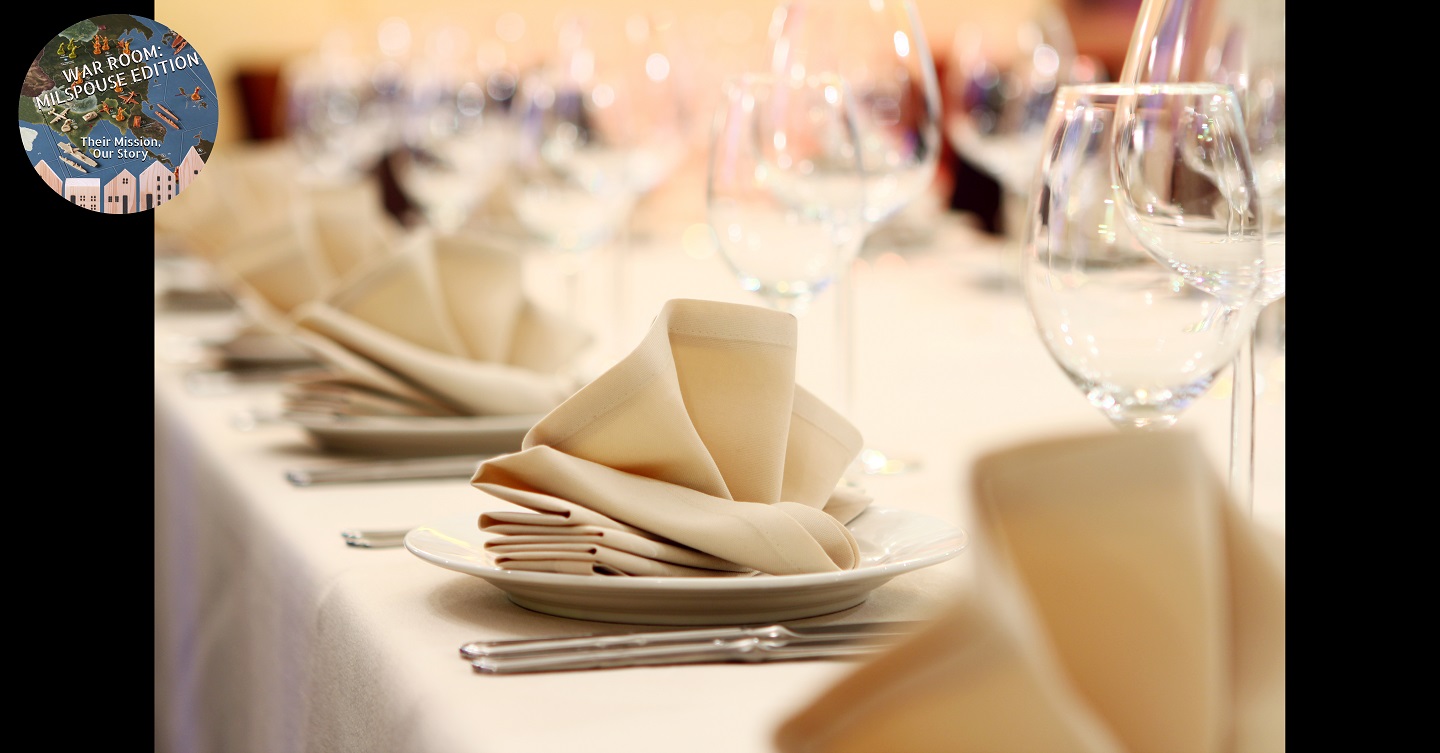
If you’re new to the military it can be a flurry of bizarre and foreign traditions and actions that make very little sense. Imagine if you’re also new to the United States. Join Faith and Lynda for their conversation with Melanie Wilhite, German by birth and an Army spouse by marriage, she is a certified Army Family Team Building Master Trainer. They’re joined by Rebecca Lockhart and she adds her perspective as a former Navy brat and current Army Spouse who embraces military life. Military customs, courtesies and traditions provide a welcome sense of belonging to all spouses regardless of rank or experience and comfort in knowing what to expect.
If it’s fluted, slotted, or slanted don’t put it in your mouth.
Podcast: Download
Subscribe: Apple Podcasts | Spotify | Amazon Music | Android | Pandora | iHeartRadio | Blubrry | Podchaser | Podcast Index | TuneIn | Deezer | Youtube Music | RSS | Subscribe to A Better Peace: The War Room Podcast
EPISODE TAKEAWAYS:
- Military traditions, customs and courtesies can be a maze of confusing actions, beliefs and activities to anyone that is new to the military. But they are integral to the identity and organizational culture of the institution and service members. They often honor the service and sacrifice of our uniformed members as well as their families.
- There is great comfort in customs and courtesies once you understand them. As you and your family move around the world you will encounter any number of cultures that may be foreign to you. Whether it’s your first time in Europe or your first time in the deep south of the United States, while the culture outside the gates may be new to you (and you should definitely go experience it) there are well established and well-known traditions on the installation that you will come to know well and participate in regularly.
- When you and your family find yourself in a joint setting learn the specific traditions of the other services. More often than not they’re pretty similar but go by different names. But each service has customs (and taboos) that are specific to their unique mission. Asking questions will teach you a great deal about the history and heritage of the other services and often teach you something about your own.
- Speaking of history and heritage, most all of the military traditions have a root in practical purpose.
- bugle calls, flags and bosun’s whistles were all forms of communication in the predigital age
- creeds ensure the beliefs and values of the service are well known and widely distributed
- Dining Ins harken back to meals shared by comrades who shared stories of the battles in the past, verbal histories were continued, unit pride and camaraderie was enhanced
- Then again not all of the traditions have a practical purpose but they usually have a pretty good story behind them. In no particular order and with no endorsement whatsoever here are just a few. Add your favorites in the comments as long as they can be shared in mixed company
- Air Force and Navy aircrew get hosed down after their final flight
- At a military wedding with a sword detail, the wife or civilian traditionally gets a sword-tap to their posterior to “welcome them” to the family.
- When a Navy ship crosses the equator, sailors perform the “crossing the line” ceremony, it can be quite a sight to the uninitiated. Ask your shipmate about the transition from pollywog to shellback.
- If you’re on an Air Force base in the month of March you may notice a sudden outburst of mustaches. Look up Mustache March and Robin Olds for more.
- Silver Dollar Salutes – you pay for the first one, the rest have to be earned
- Navy Shooters launching their boots of the deck with a cat shot
- Challenge coins – there’s a whole podcast episode here
- Shooting a new platoon leader’s patrol cap (artillery and tankers?)
- If you find yourself in charge of organizing an event or ceremony contact your installation Protocol or Executive Services office. Customs and courtesies are their livelihood and if they can’t help you directly they can surely point you to the right references and resources. Local protocol books for each installation are usually available.
- For the really curious
- Army Regulation 600-25 Salutes, Honors, and Courtesy
- Department of the Army Pamphlet 600–60 A Guide to Protocol and Etiquette for Official Entertainment
- TRADOC Memorandum 1-16 Distinguished Visitors, Conferences and Ceremonies
- OPNAVINST 1710.7A Social Usage and Protocol Handbook
- Air Force Manual 36-2203 Drill and Ceremonies
- Air Force Handbook 1 The Airman Handbook
- AIR FORCE INSTRUCTION 34-1201 PROTOCOL
- MARINE CORPS ORDER P5060.20 W/CH 1
- History and Heritage
- Historical Office, Office of the Secretary of Defense
- U.S. Army Center of Military History
- Naval History and Heritage Command
- Air Force Historical Support Division
- Marine Corps History Division
- U.S. Space Force History (it’s just a page right now but they’re hoping to expand)
- U.S. Coast Guard History

Rebecca Lockhart is an Army spouse of almost 10 years and a child of the military after her father served in the Navy for 20 years. She’s a mom of two girls with a little boy on the way and positively embraces military life and all the amazing opportunities that it provides. Currently located in Southern Georgia, Rebecca spends her time volunteering locally with her husband’s SFRG, the local post chapel and in worldwide volunteer organizations.
Melanie Wilhite is a mother of two and Army Spouse for the last 15 years. German by birth, she’s adapted to military life and life in the U.S. as an avid volunteer at Army posts and the surrounding communities that her family has been stationed at over the years.
Faith Bomar is not as funny as she thinks she is, according to her loving Army officer husband of nineteen years. She is the mother of four children only because it seemed like a good idea at the time and as a result of this, she has changed dirty diapers from CA to PA and on three different continents. When avoiding cooking dinner she spends her time working outside of the home as a Doula and giving her time away to the community as a perpetually unprofessional volunteer.
Lynda Lind has spent the last 15 years as a Navy wife and devoted volunteer. She is a stay-at-home mother of 2 with the survival skills needed for 7 moves and multiple deployments. She likes to spend her free time cooking and sewing, and has loved this year learning more about how the Army does things.
The views expressed in this presentation are those of the speakers and do not necessarily reflect those of the U.S. Army War College, U.S. Army, or Department of Defense.
Photo Credit: Hotel restaurant photo created by Racool_studio – www.freepik.com
Other releases in the “Mil Spouse Edition”:
- OUR HEALTH & WELLNESS STORY: TAKING CARE OF YOU
(MIL SPOUSE EDITION) - OUR EMPLOYMENT STORY: NAVIGATING RESOURCE OVERLOAD
(MIL SPOUSE EDITION) - OUR VOLUNTEER STORY: WHERE CAN YOU HELP?
(MIL SPOUSE EDITION) - OUR PCS STORY: BE POSITIVE AND FLEXIBLE
(MIL SPOUSE EDITION) - OUR EDUCATION STORY PT 2: EXCEPTIONAL NEEDS? HELP IS HERE
(MIL SPOUSE EDITION) - OUR EDUCATION STORY PT 1: SCHOOL AND PCS
(MIL SPOUSE EDITION) - THEY’RE TAKING OVER! MEET THE HOSTS
(MIL SPOUSE EDITION) - THEIR MISSION, OUR STORY
(MIL SPOUSE EDITION)




